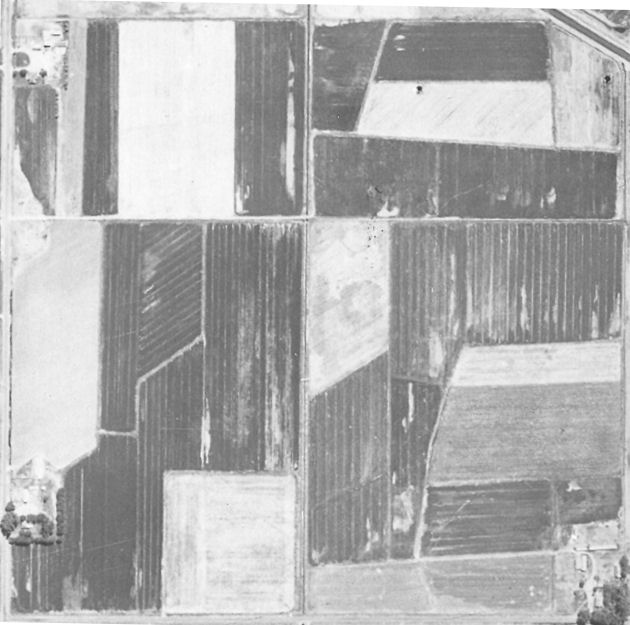Chapter 5
CELIA
Gordon and Celia were
married at the home of her parents by Bishop Morris Baker on
September 22, 1954. For their honeymoon, Gordon's folks took them to
see the Ice Follies in Salt Lake City. While they were gone a couple
neighbors had most of his beans thrashed. There was twelve acres of
beans that did not ripen until very late. While they were laying in
the windrow, a windstorm came up one afternoon. All Gordon and his
new bride, Celia, could do was stand on the back porch and watch them
blow away. Celia made the comment, "If this is farming, I don't
know if I want much to do with it, or not."
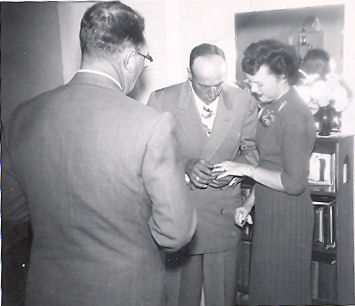
Gordon and Celia being married
The next spring Gordon went
to work for Newel Baker as well as ran his own farm. Mr. Baker put
him in charge of the farm as foreman over 960 acres and five hired
men as well. On Father's Day, Sunday, June 19, 1955, he had two big
streams of water turned together. There was over 500 inches all
together. That day he left a hired man with the water because he had
something more important to do. He had to take Celia to the hospital
to have their first child. When Doctor Sutton came out of the
delivery room he asked Gordon, "Well, what do you want?"
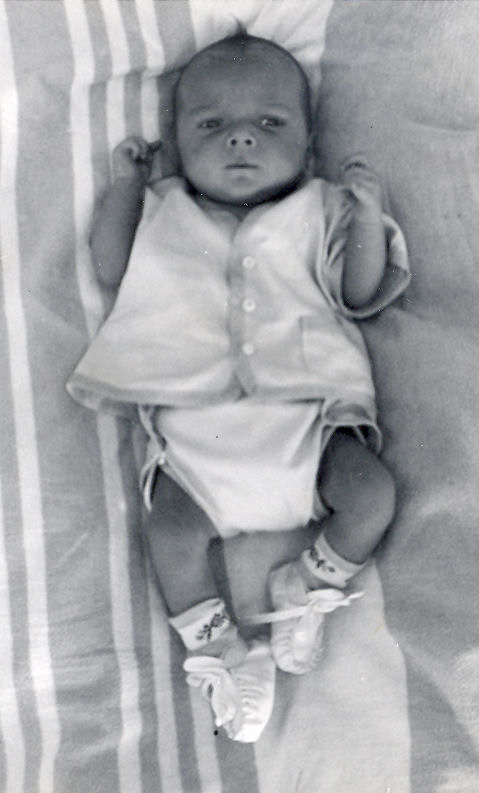
Little Gordon
He replied, "By God, it had better be a boy" He wasn't disappointed either. That day Gordon Gene was born.
The rest of that year he
ran the Gee place, milked his cows and worked for Newel Baker until
September. The next year Gover was going to sell Gordon the home
place. They moved into the house and during 1956 and Gordon farmed it
and rented a another the Van Engelen farm down by the river. When it
came time for the next year, Gover and Aunt Mary decided they wanted
the farm back.
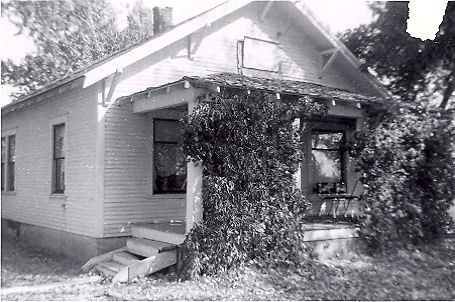
The house on the Gee place
Gordon had nowhere else to go
for land and was left with no other choice than to have a farm sale.
By then he had a good line of machinery. He had a B John Deere, and a
Super M Farmall, a tumble bug plow, a set of discs, some harrows, and
a beet topper, along with other odds and ends. He sold his dairy
heard too. It was about this time that he traded his Studebaker in on
a 1953 Buick. 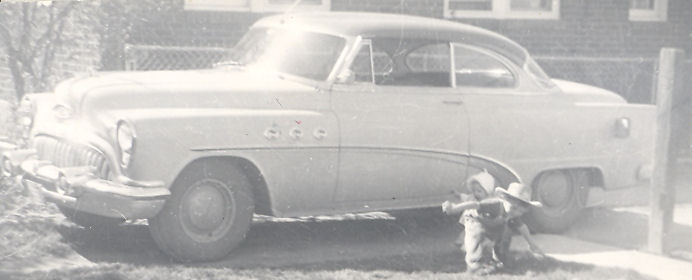
Gordon's 1953 Buick
Gordon learned that Phillip's
Petroleum was looking for service station managers. Not knowing what
else to do except that he wanted to work for himself, he thought he
would give it a try. So Gordon, Celia, little Gordon, along with
Melody and Tim moved to Salt Lake City. Not long afterwards, Gover
sold the farm to someone else.
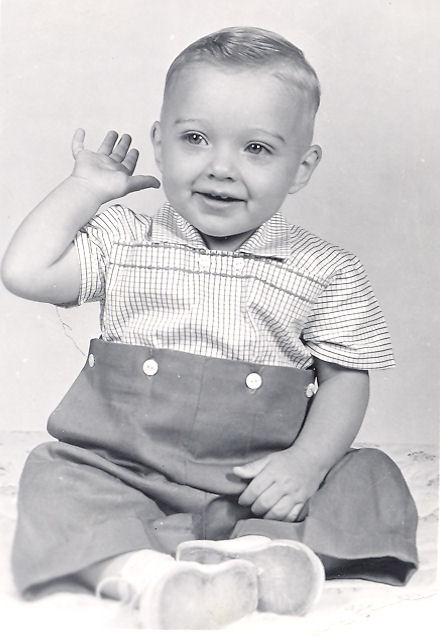
Little Gordon at 1 year old
Gordon moved his family to
Salt Lake (except for his dog Nick for who he had to find another
home) where they lived at 1350 E. 27th South. Gordon was paid $285 a
month while he attended the Phillip's Petroleum School. Along with
the schooling, came on the job experience. This was working the
midnight to eight shift at a service station. That got old fast. He
told the instructor that he was not going to work that shift any
longer. He told them he didn't mind working from four in morning
until real late at night like he had on the farm. Besides, his wife
was expecting another baby and he wanted to be free. He added that if
they did not change his work schedule he was going to quit. They
didn't want him to quit because they knew that he had enough money of
his own to get started in a station. Usually Phillip's had to loan
out the money. Because of this they changed his schedule to something
more suitable.
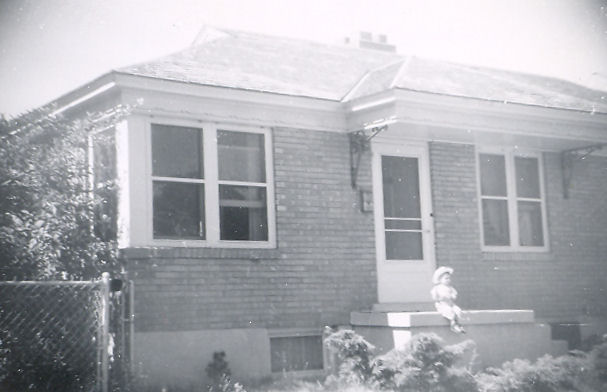
1350 E. 27th South Salt Lake City
On June 2, 1957
Cindee was born in Salt Lake City. Celia had trouble with the
pregnancy and went into to premature labor on more than one occasion.
When the baby was coming for real, they just barley made it to the
hospital in time. Soon after Cindee was born, she began loosing
weight because she was not getting enough nourishment. She was thin
when she was born as it was.
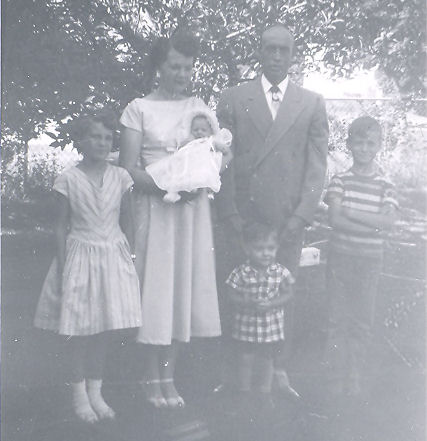
1957 family picture: Melody, Celia holding
Cindee, Gordon with little Gordon in front
of him, and Tim
About a month later they
came to Burley for a vacation. While there, they took her to Doctor
Sutton. What Cindee needed was a stronger formula. The main purpose
for the vacation was a trip to Yellowstone Park with the Cecil Toner
family, some former neighbors in Burley. Cindee was too small to take
on such a trip and was left with her Grandmother Frost. 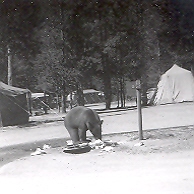
The bear that wandered into
camp looking for food
The two families camped out in tents. Gordon never was much for camping and roughing it. One Morning a bear strolled into camp just in time for breakfast. The first thing Gordon did was put little Gordon in the car where he would be safe. Cecil was cooking breakfast that morning and was armed with a pan cake turner. The bear came sniffing around to see what he could find to eat and appeared harmless. When he got close enough Cecil spatted him on the nose. The bear turned and ran across the river and and up the hillside.
In the Summner of 1957
Gordon graduated from the Phillip's Training School and moved to
Ogden, Utah. They lived at 555 South 5th Street. On the corner of
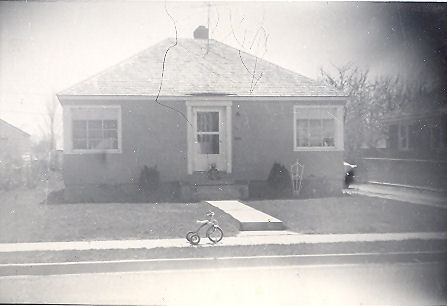
555 South 5th St. Ogden
13th and Wall he opened a brand new service station. He had $3600 of
his own money from the farm sale. To go with it he borrowed $2000
from the Bank of Ben Lomand. After buying his equipment and tools,
and getting his tanks filled, Buttars' 66 was ready for it's grand
opening on August 30th.
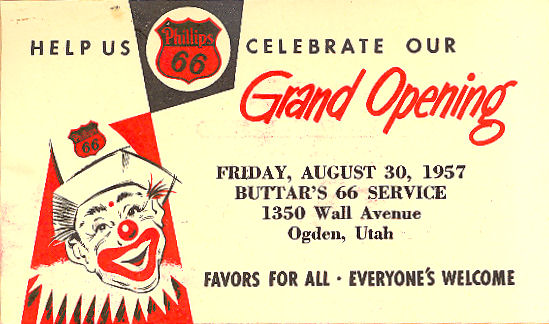
After the first winter,
Gordon got homesick for the farm and wanted to go back. Getting
started was rough. Business was slow and he wasn't making much money.
Rather than having him go under the jobber let him go rent free on
the station for three months so Gordon could get better established.
The rent was $150 a month. He even let him charge fuel when everyone
else had to pay before the delivery truck left the station. He had
good credit.
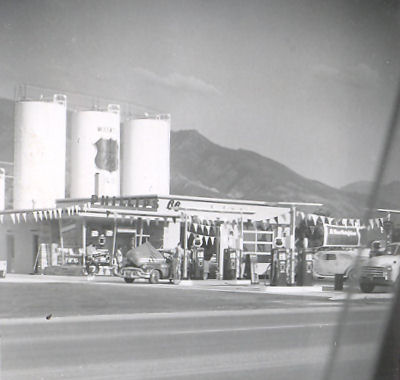
Buttars' 66
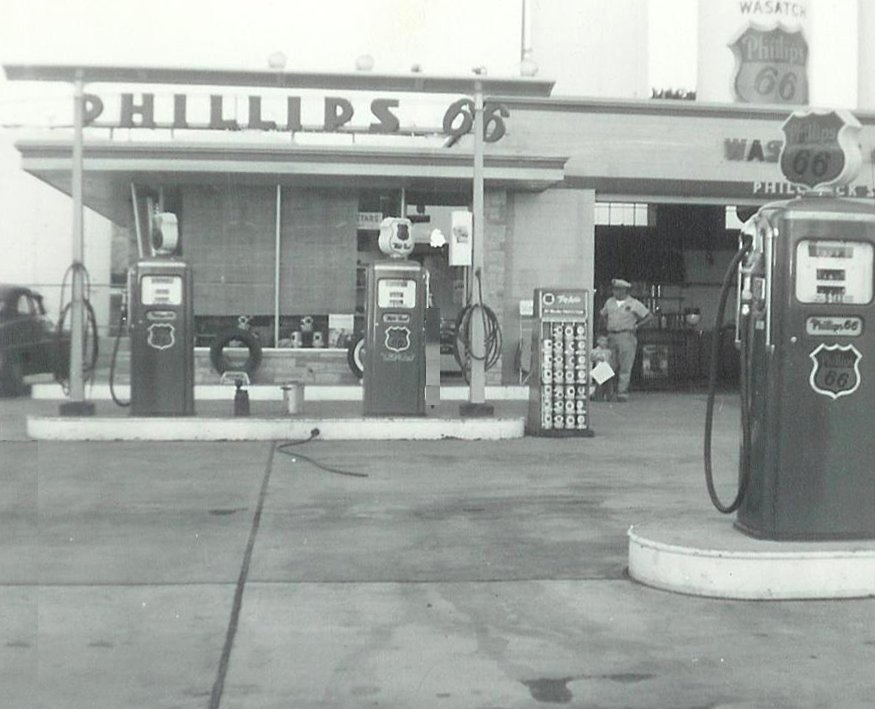
Gordon and Little Gordon standing in the open bay door
Business started to pick up
and he soon began seeing where he might get his feet under him. He
soon had several steady costumers. His station also became a popular
place for bull sessions. As a prank, one of his regular customers
signed his check, “Youare Stuck.” Naturally, the bank refused it
and sent it back to the station. It didn't take long to figure out
that it was written as a prank by a truck driver for a company that
did business with him.
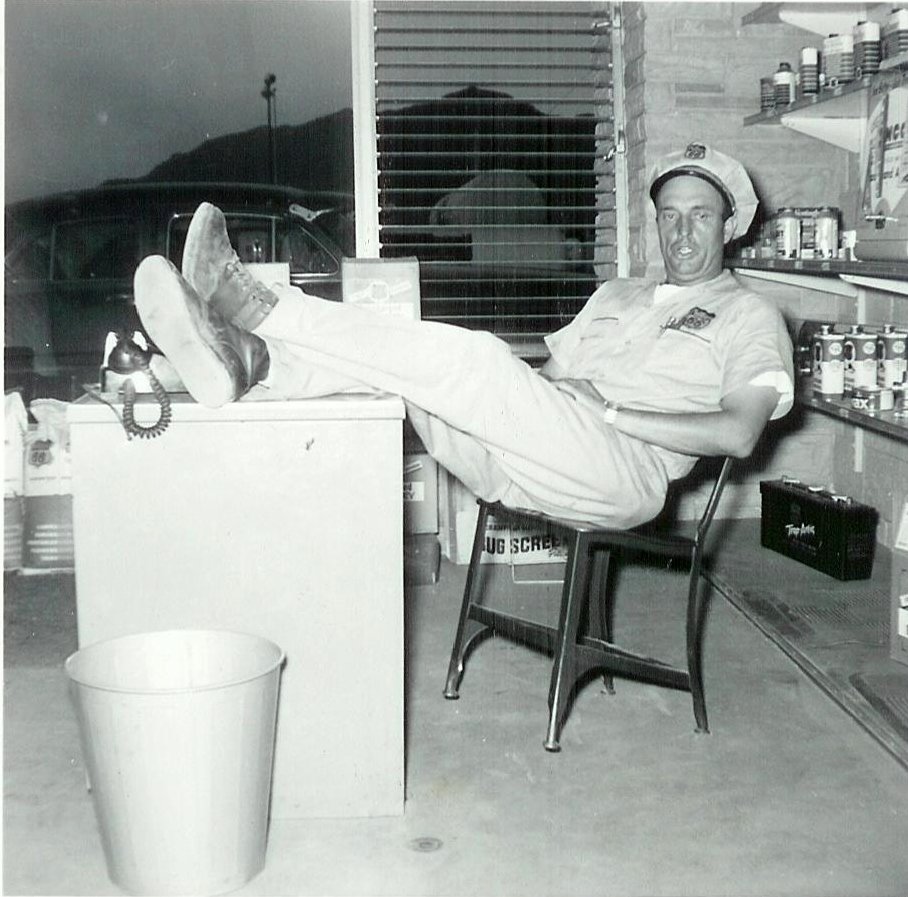
Taking a break on a busy day
Gordon and the salesman from from that company hatched a plot to get turn the joke around on him. The salesman casually mentioned to the truck driver that someone had written a bogus check to Buttars' 66 and that he had turned it over to the FBI. (He really didn't, he kept it in a drawer.) They toyed around with him for two or three weeks. In the process, he got scared and confessed that it was him and plead for Gordon to get it back and tell the FBI that it was all a harmless joke.
Gordon told him that he would see what he could do. After about another week of making the pour guy think he was going to prison, Gordon finally told him that he was able to convince the FBI to not pursue the case and gave him the check back. He promptly wrote about a properly signed check and went on his way. The prankster never knew that he had been pranked.
Even though business was
picking up it became clear that he was in the wrong business. He had
too much farm blood throbbing through his veins. On a visit to Burley
Gordon learned of some of ground for rent out on the desert. The very
thought made that old farm blood pump even harder, and he liked the
station even less. But Celia liked the city and did not want to move
back to Burley and the farm.
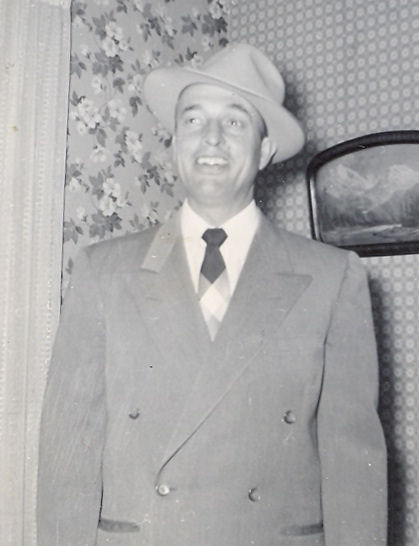
Gordon in 1958
One day he came to the end of the line. He had already rented the desert ground. When Gordon told Spence Bagnell (the jobber) he wanted to quit, Spence only tried to convince him to stay. When he threatened to throw a match to the whole place, he finally believed him and found someone to buy him out.
Gordon went right down to the John Deere dealer there in Ogden and bought two tractors, a John Deere A and a G. He also bought a side rake, a set of discs, and a tumble bug plow along with four sections of harrows plus a few odds and ends.
Gordon wrote out a check for $4600. The salesman asked, "Now, where do you want to have this delivered?"
He asked so Gordon told him. "Six miles south and four miles west... of Burley, Idaho."
The salesman pounded the desk and shouted, "Hell no!" Gordon reached for the check and said, "Alright then." The salesman gave in and delivered the two truck loads of machinery without cost.
There was 250 acres but no
house so they rented one from Spencer Bingham at 400 South 100 West,
five miles from the farm. He planted most of it to beans and the rest
to barley. That fall the rain caught his beans out in the field. It
was November before they were thrashed but they still yielded
twenty-one sacks to the acre. It was a rocky ground and not very good
farm land. Gordon only farmed out there the one year.
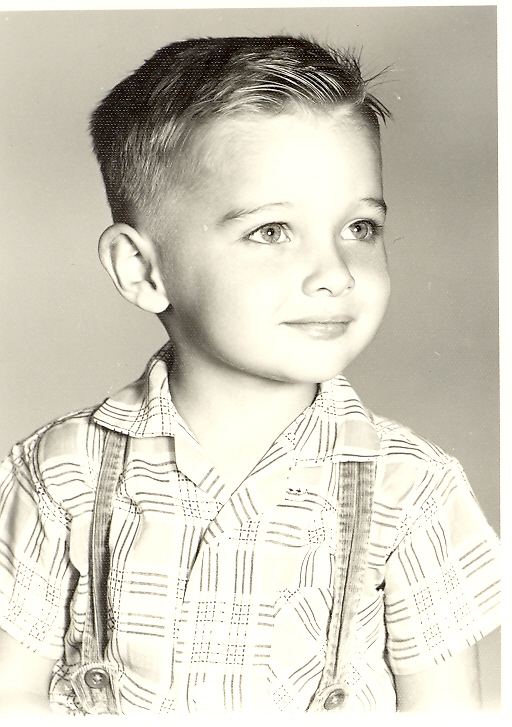
Little Gordon - age 3
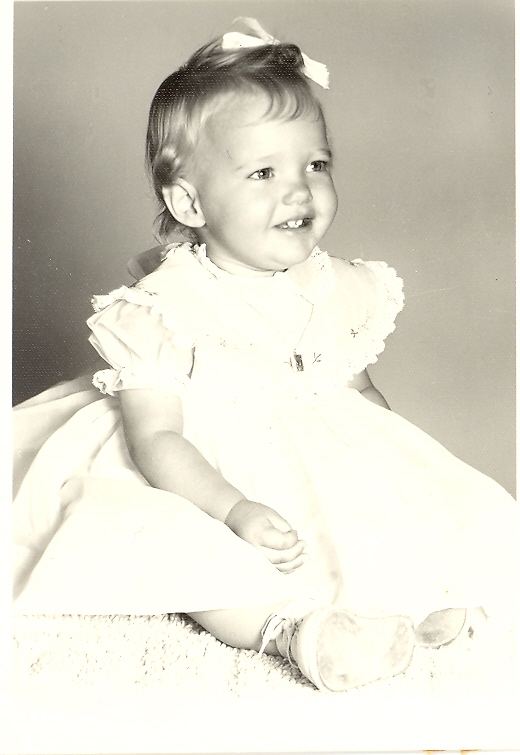
Cindee - age 1
In the fall of 1959 he found
a place to buy. It was 50 acres just down the road a mile to the
south of where they were living. He moved his family into the house
and got the fall plowing done. The deal was all settled. Gordon was
to receive $2,700 in April for his previous years bean crop. He would
then give Mr. Hitt $2,500 down and then pay him $1000 a year at five
percent interest until it was paid. Every thing was agreed upon until
someone offered Mr. Hitt $5,000 down in cash. Mr. Hitt took it,
leaving Gordon out of the deal. He even had the 50 acres across the
fence rented from Clark Judd.
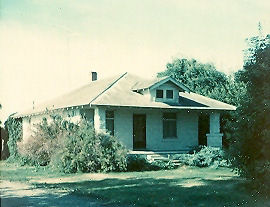
The house on the Hitt place
100 W 500 S Burley
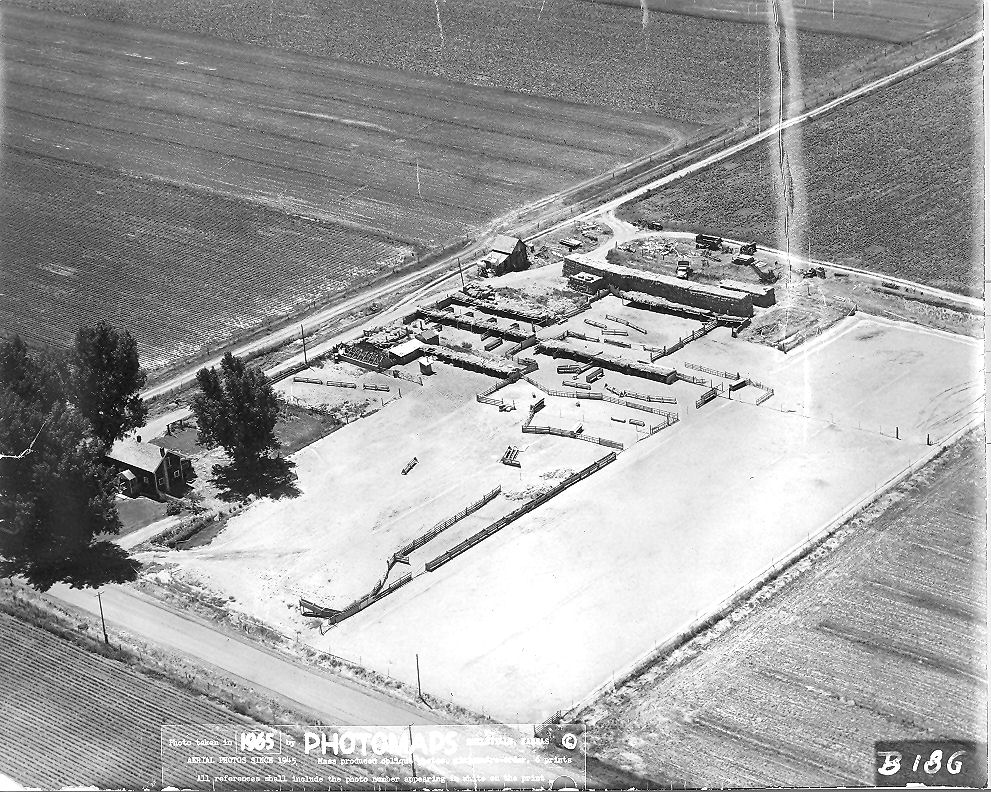
The house, yard, and corals at the Story place in 1965
Now he had to find some
other ground for the next year. He got a hold of an eighty a couple
of miles away that belonged to Edna Story. For the second time that
fall and winter Gordon moved his family to another home. In the
spring of 1960 he planted the first of many crops on Story's. To go
with it he had some other ground rented a couple miles away and let
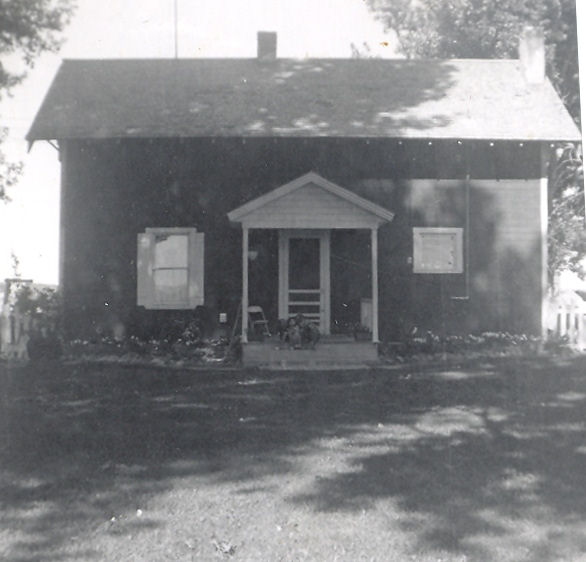
The house on the Story place
550 S 150 E Burley
the Judd place go. The next year, Jake Kershisnik, a neighbor across
the road, came to Gordon and wanted him to rent his his 80 acres.
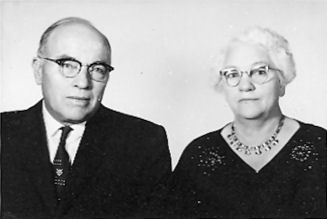
Gover and Aunt Mary in 1961
In the fall of 1961, he got into the Sheep business. Each fall he would buy ewes from Garnet Kidd that were being culled from his from heard. During the winter Gordon would lamb them. In the spring he sold the lambs as well as the ewes. This way he didn't have land tied up in pasture. His time and land were available for raising other cash crops during the growing season. Then the next fall he bought another band of ewes, usually between 200 and 300 head.
It was also in the fall of
1961 when his family became complete. Connie was born September 29th
at the new Cassia Memorial Hospital. Celia had a hard time carrying
Connie as well. She came close to losing the baby several times and
was sick a lot of the time and had to be down in bed. Sometime during
the next year however his household was reduced from five children to
only three. Melody and Tim went to live with their father in
California.
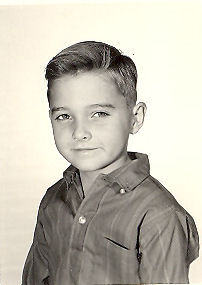
Little Gordon - age 7
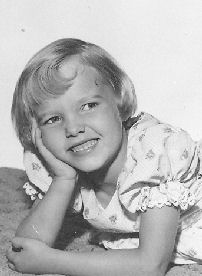
Cindee - age 5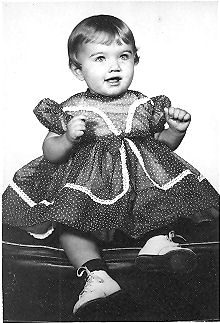
Connie - age 1
Gordon was able to pickup some more ground and needed help. During 1962 he hired Les Turner. Les was still in high school and only worked during the summer. After he graduated, Les worked full time (except for the winter months) for the next nine years. With Les, Gordon could run even more ground.
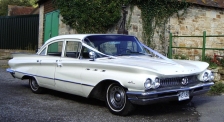
A 1960 Buick LeSabre
In 1963 Gordon traded the old
'53 buick for a 1960 Buick Le Sabre. He bought most of his cars in
Kemmerer, Wyoming from Vernal Peterson. The old car never ran better
than on the way to Kemerer. Then in 1965 Gordon traded once again.
This time for a red 1963 Buick Le Sabre.
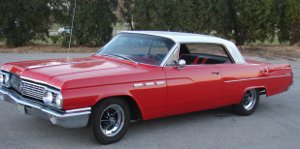
A 1963 Buick LeSabre
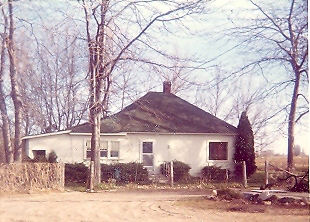
510 S 50 W Burley
The soil at the new place
was extremely rich and fertile. It was called goose creek because
hundreds of years ago a flood that occurred on Goose Creek that
brought with it rich, black, volcanic soil down from the mountains
covering the existing terrain leaving a blanket several feet deep.
This band of soil was two to three miles wide and stretched form the
mountains south of Oakley all the way to the Snake River. The soil
was so heavy that it had to be handled differently, but the crops
yielded better.
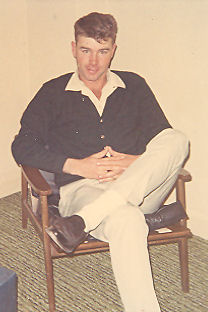
Les Turner
With everything ready Gordon, Les, young Gordon, and whoever else he could roundup drove the sheep the two miles to the new place. Now he owned his own ground Gordon planted about ten acres of pasture and began to keep some ewes over during the summer, adding younger ones in the fall.
With this 53 acres, he rented 50 acres to the south. He also kept Story's and Jake's across the road from Story's. Besides this he had the Van Engelen place on the river again and some desert ground across the canal. That year he had two other men besides Les. Altogether he had 400 acres. As he put it, "I've got ground scattered from the river to the desert." It was too much to try to operate efficiently. After that, he began to cut back to what he could handle. He kept the Story place for one.
As a family, they took a
few trips together. The best time for a vacation was during about the
second week of August when the watering was all caught up and just
before the harvest. While going to the Phillips School, Gordon got
acquainted with Neil Hart, who went on to open a service station in
Rexburg, Idaho. Neil and his wife, Shirley, also had three children
and the two families were close friends. On several occasions the
Buttars went up to Rexburg to see the Harts. While there they took
the opportunity to go to Yellowstone Park. On another occasion they
went on up into Montana from Rexburg. There were some trips to Nevada
to see Milton. One summer they took a trip through Central Idaho to
Salmon and Stanley. If there were things that needed done while he
was gone, Les could handle it. 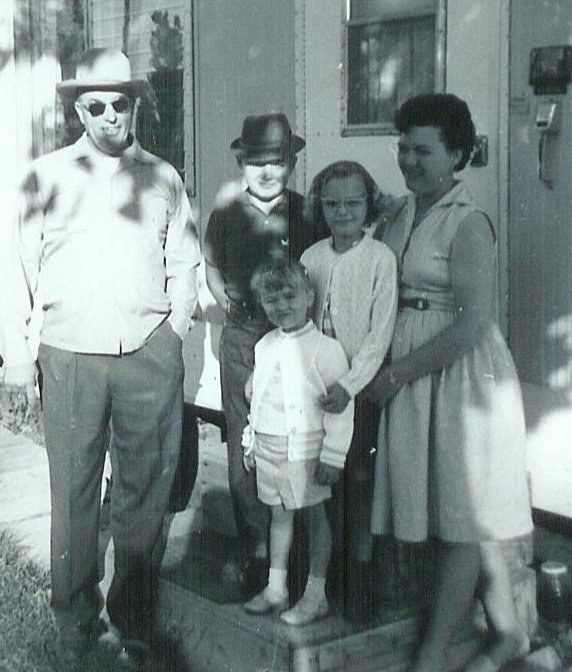
Gordon, Little Gordon, Connie, Cindee, and
Celia at Milton's home in Nevada - 1965
The Cassia County Fair and Rodeo occurred during this time as well. Most years they went to the fair toped off by an evening at the rodeo. Celia's family always had a family reunion about the first or second Saturday in August. He always referred to it as “the rendezvous.” Sometimes he would go long enough to have something to eat, but he didn't feel very welcome around them.
As a family, they went to the drive in movie at the Alfresco Theater on occasion. Before going out, they would dress the kids in their pajamas so they could fall asleep in the back seat of the car during the movie. Went they got home, they packed the kids into the house and put them in their beds. Other times they would go out as a family and have hamburgers at the A&W.
Gordon had nick names for
each of the kids. For some reason Gordon was Piddles. Cindee was
Jimm, and Connie was Jomm and. Another name he had for Cindee was
Puge. He and his brothers all had nicknames that they called each
other. Gordon was John. Milton was Rudger, which actually his middle
name. Ralph was Peter and Orvin was Andro.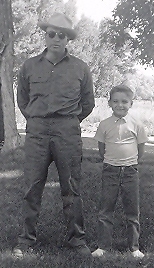
Father and son 1963
He had a lot of silly words that he used.. Some had meanings. For example; chawtet was water. Some of the words had no meaning and could be used for any thing. Words like; demifriss, geekersoker, fiddlymocker, agoonyaqualila, heskalemilyho, or phrases like; a beestisho and a waistishum.
In addition to these silly words, his vocabulary also included a repertoire of other words that are not appropriate to be used here. He included one or two of these words in about every sentence. He wasn't hesitant to use them either. Not everyone spoke his language, but everybody understood it.
Gordon took his work
seriously and took care of his family. Sometimes he felt maybe he was
too busy to take much time out for his family. The farm and the sheep
were very demanding on his time and every move counted, but he felt
it was better than having hungry kids. At least he was close to home
and in and out of the house during times a day.
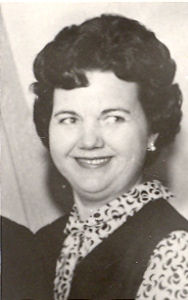
Celia - 1965
Gordon's day usually began at four o'clock in the morning and make a pot of coffee. The he would sit at the kitchen table and work the numbers a few cups of coffee and about as many cigarettes. He would run figures on costs and prices and yields. He would have everything figured out and what he needed to do before he went out the door. Then the next morning he would figure it out again and come up with something completely different. Sometimes it lead to indivisiveness on his part. Farming was always a gamble. There was so much over which there was no control. Sometimes he hit the market just right. Other times he sold his crops to soon and the prices went up. Other times he waited to long and missed the peak prices. When it got light outside, it was time to go out and take care of the chores or set the water. Breakfast had to wait until the chores were done or the water had been set. Most mornings breakfast consisted of bacon and eggs. Often lamb chops were served in place of bacon.
He always took a break at noon for dinner. That was the big meal of the day. It most likely included a roast (usually lamb) with mashed potatoes and gravy. After dinner he always took what he called a snooze, a fifteen or twenty minute nap, before going back out to work. Then at 4:00 sharp he took a thirty minute coffee break. Many of his friends knew they could stop by at that time for some freshly brewed coffee. When they got to shooting the breeze, much more than a half an hour went by before he got back to work.
Even though Gordon didn't go to church, Sunday was always a day of rest, except for for the usual daily chores involved with the sheep or changing the water. Celia and the kids usually went to church. Gordon did have a suit and always dressed up when he had somewhere to go. He never wore a colored shirt with his suit, because you weren't dressed up without a white shirt and tie. Nor was his attire complete without a dress hat.
In the fall of 1966 Celia
went to work at the U&I beet dump weighing beet trucks. This was
the first time she went to work since they were married. They were
planning a trip to Hawaii in December and the money would be used for
the trip. December 7, 1966 was the twenty-fifth anniversary of the
attack on Pearl Harbor and the Pearl Harbor Survivors Association was
holding a reunion.
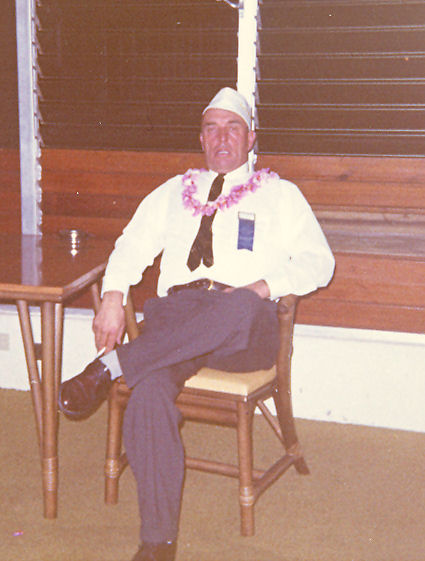
Gordon in Hawaii in 1966.
Gordon, Cindee, and Connie were distributed among Celia's sisters. Gordon and Celia drove to Reno, Nevada and left the car at Milton's. From there they rode the train to San Fransisco and flew to Honolulu on a Boeing 707 jetliner. At Pearl Harbor Gordon revisited some old stomping grounds. They even stayed at the Royal Hawaiian where he had stayed many times while in port. They spent ten days touring the island before returning home.
They got home just in
time. Gordon's father had been ailing with emphysema for quite some
time and was in the hospital. Gover died on December 24, 1966, just
two weeks after his 71st birthday. Gover is buried in Clarkston next
to his first wife, Mary. When they dug his grave they got too close
and scrapped her casket. Gordon was one of the pallbearers.
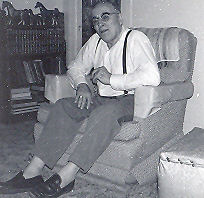
Gover, a few months before
he died
Gordon felt the loss of his father. During Gover's later years they spent a lot of time together. He would take little Gordon and the two of them went down to his folks for breakfast once in a while. Other times he would take his dad to the water with him or to town after parts or on business. If Gover and Aunt Mary needed to go to Salt Lake or someplace, Gordon was there to take them. A tradition was to go to Clarkston on Memorial Day together every year. After Gover died the tradition continued.
During the fall of 1967 Celia went back to work at the beet dump. Then one day, everything changed. Celia confessed to having made a terrible mistake in which she became trapped.
His family was the only decent thing he had in life, and later in life at that. He wanted life to go on as it had for the last thirteen years. It was of no use, living with the heartache was next to impossible.
That fall, Gordon had to have a hernia operation as soon as the crops were out. He got out of the hospital in time for Thanksgiving. Gordon didn't feel that he had much to be thankful for.
In February Celia left. After only a few days, he asked her to come back on account of the kids. He hoped to hang on at least until school was out. One morning in late spring Gordon and Gordon were waiting for a stream of water, when the Deputy Sheriff found him and served divorce papers. That day she moved out, taking Cindee and Connie with her. At the time, young Gordon was twelve, Cindee was ten, and Connie was six.
A bitter and costly court battle followed. Gordon had to mortgage his farm for more than it was worth in order to pay the attorney fees and court costs and all of the expense that goes with a divorce. On May 11, 1968 it was allover, as far as the legalities went. He ended up with Gordon, the farm, a lot of debt, and a broken heart.
While all this was happening, a second opportunity to buy the Hitt place across the fence came along. Like in 1959, the opportunity fled from his grasp.
All there was now was to pick up the pieces and try to start over. The first thing to do was to get a refrigerator and stove, and buy some groceries. Kind hearted neighbors brought in a meal once in a while. The only way he could get his mind off things was to work and work hard. Young Gordon was with him twenty-four hours a day. They even slept together because they only had one bed. At noon he would let "Sis" off to pop a couple TV dinners or meat pies in the oven while Gordon went to another stream of water. When he got back to the house, dinner was ready. He always told Gordon that someday he would make someone a good wife. During the next several months they became inseparably close.
